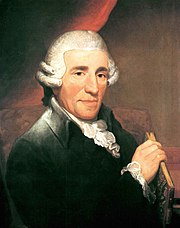L'incontro improvviso
| L'incontro improvviso | |
|---|---|
| dramma giocoso by Joseph Haydn | |

Portrait of the composer by Thomas Hardy, in 1791
|
|
| Translation | The unexpected encounter |
| Librettist | Carl Friberth |
| Language | Italian |
| Premiere | 29 August 1775 Eszterháza |
L’incontro improvviso (The unexpected encounter) (Hob. XXVIII:6) is an opera in three acts by Joseph Haydn first performed at Eszterháza on 29 August 1775 to mark the four-day visit of Archduke Ferdinand, Habsburg governor of Milan and his consort Maria Beatrice d'Este. The opera is designated a dramma giocoso (a comic opera) and is an example of the then Austrian fascination with Turkish subjects.
The libretto by Carl Friberth was adapted and translated from a French opera-comique by L. H. Dancourt, previously set by Gluck in 1764 as the La rencontre imprévue. In keeping with Italian practice, Friberth constructed longer buffo finale texts at the end of Acts I and II.
It is not known if any further performances followed the Eszterháza production, although a German translation was made for Bratislava. Danish musicologist Jens Peter Larsen discovered the autograph score in Leningrad in 1954, and the opera was subsequently broadcast in Russian in 1956. It was first staged in the UK at the Camden Festival in 1966. The first complete recording was made by Philips in 1980 in association with the Radio Suisse Romande and the European Broadcasting Union, conducted by Antal Doráti. The first performance of the German translation was staged by Jakob Peter-Messer for the Wuppertal Opera in 2010 in cooperation with the Haydn-Institut in Cologne.
Overture (this was printed by Artaria in a set of six in 1782 without trumpets and percussion)
A storehouse of all kinds of merchandise and edibles
The qalandar and dervishes drink wine, smoke tobacco and sing merrily of their life as beggars and tricksters.
A square
Osmin is distracted by the qalandar begging; he has little trouble in persuading the hungry Osmin to become a mendicant dervish.
A room in the seraglio
Rezia has been told that her long-lost love has been sighted in Cairo, and shares the news with Balkis and Dardane in a beautiful trio.
A square
Ali, alone, explains how he fled to Persia and fell in love with Rezia. Though betrothed to another, Rezia eloped with Ali but they were separated and she was captured by pirates. Ali watches as Osmin is taught by the Qalandar the chant "Castagna, castagna". The Qalandar recognises Ali as the Prince of Balsóra. Balkis greets Ali with news that a woman has espied him from a window in the seraglio and wishes to meet him.
A room containing a banquet table
Osmin is enjoying a feast with Ali arrives with Balkis, and Ali gets increasingly angry with Osmin's inebriation.
...
Wikipedia
